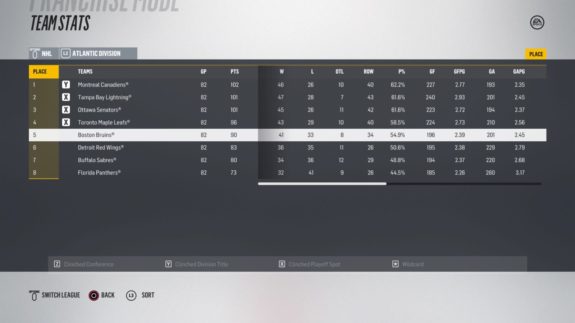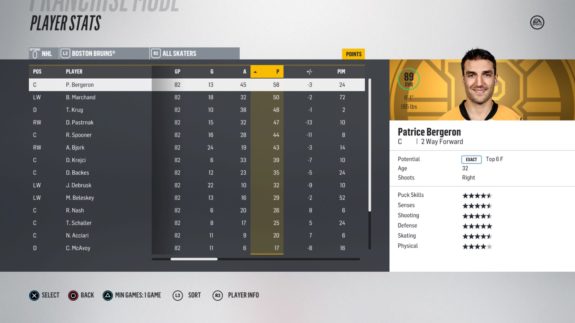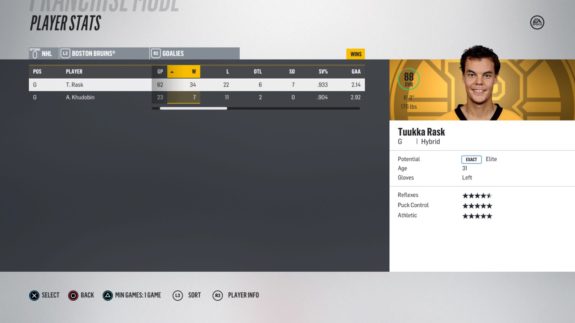The NHL season has begun and the Boston Bruins are 1-0-0 after a 4-3 win over the Nashville Predators on Thursday night. Adding to the win was the fact that they did so without Torey Krug, Patrice Bergeron, and David Backes.
Boston’s lineup features a number of rookies this season, including Jake DeBrusk, Anders Bjork, and Charlie McAvoy. Judging how these players, as well as the club’s veterans, will play this season is tough. Though Bruins fans have aspirations for a deeper playoff run than last year’s first-round exit due to aforementioned added talent, how consistent will they be?
We’ll use NHL 18’s Franchise Mode to simulate the 2017-18 NHL season and see how the Bruins fare.
Anders Bjork is not in the game’s most recent roster update, so I went ahead and added him. Given Jake DeBrusk’s rating of 70 overall, I gave Bjork a rating of 72. His speed, wrist shot, and agility are all in the 80s, giving him the ability to produce on the first line.

Injuries are turned off for this simulation, as they are distributed randomly in the game. This also ensures that we will get a good reading on players at their positions as they will be locked into them. For example, this will simulate how Brad Marchand, Bergeron, and Bjork do as a line for 82 games.
Bruins 2017-18 Season Results
Based on the simulation, the Bruins will end the 2017-18 season with a record of 41-33-8 and 90 points. They will go 20-18-3 at TD Garden while achieving a 21-15-6 record on the road. The Bruins will score a total of 196 goals but give up 201 in the process.
The simulation predicts that Boston will maintain an 83.8 penalty-kill percentage while scoring on just 15.5 percent of their power plays. They will score three shorthanded goals while giving up two shorthanded goals themselves.
The Bruins, however, are predicted to not make the playoffs. In the Atlantic Division, they will come in fifth, trailing six points behind the wild card-winning Toronto Maple Leafs.

The Montreal Canadiens will take the division with 102 points; other outlets predict a more modest finish. Following them are the Tampa Bay Lightning and Ottawa Senators before the Maple Leafs. The Detroit Red Wings will trail Boston with 83 points while the Buffalo Sabres and Florida Panthers will find themselves in the division’s cellar.
This finish would be less than satisfactory for the Bruins after a first-round exit from the postseason last year. Fans and critics alike are predicting a second-round appearance. Anything short of that would be considered a failure.
Skater Stats 2017-18
A great aspect to look at when doing these kinds of simulations is individual statistics. For example, Marchand led the Bruins in production during the 2016-17 season. Who will lead the way this season?
According to NHL 18, the answer to that question is the always reliable Bergeron. That I can live with. On the flip side, only 13 goals and 58 points aren’t the stats you’re looking for from whoever sits at the top of your team’s points plateau.

Marchand follows up with just 18 goals and 32 assists, totaling 72 penalty minutes to boot. The simulation predicts Krug to tally 10 goals and 38 assists, placing himself in third place when it comes to Boston’s production for the 2017-18 season.
David Pastrnak disappoints after getting his payday, scoring just 15 goals and assisting on 32 others. Spooner scores 16 himself and accumulates 28 helpers, a boost from last season. Anders Bjork is projected to lead the Bruins in goals with 24 while assisting on 19.
David Krejci only scoring six goals is a shocker, as well as just 33 assists. DeBrusk is the only other Bruin besides Bjork projected to break the 20-goal threshold, notching 22 himself and helping out on just 10 others. Charlie McAvoy is predicted to score 11 goals, the most of any Bruins defenseman, while tallying just six assists.
NHL 18 predicts that Tuukka Rask will have a good campaign, featuring a 34-22-6 record with a .933 save percentage (SV%) and a 2.14 goals-against average (GAA). Even more impressive is his seven shutouts on the year.

Rask is projected to backstop the Bruins 62 times this season, while backup goaltender Anton Khudobin is expected to make 23 appearances. His record of 7-11-2 is not up to snuff, while he managed a .904 SV% and a 2.92 GAA.
Is This Simulation Accurate?
A big problem with these simulations is the fact that rookies are often very underrated in the game. For example, Charlie McAvoy, who many believe is a frontrunner for the Calder Trophy this season, received a rating of just 81 overall.
With DeBrusk scaled down to a 70 and our version of Bjork at a 72, the other skilled players in the lineup, such as Bergeron (89), Marchand and Pastrnak (87), and Krejci (84) are weighed down. This bodes poorly for Boston and will fortunately not be the case this season.
DeBrusk and Bjork would not be slated in the Bruins’ top-six if they were going to weigh down their respective linemates. The same can be said for McAvoy captaining the team’s power play. If Bjork and DeBrusk were bumped up to 80 overalls, Boston would fare much better in the 2017-18 season, which feels like a more accurate result.
Critics around the league are quick to count the Bruins out when they don’t recognize a number of names on the roster. Boston’s rookies, however, are out to prove the critics wrong. In the end, this simulation is a good example of what might happen if Bjork, DeBrusk, and McAvoy aren’t up to the challenge. Based on the Bruins’ home opener on Thursday night, however, these rookies have given every indication that they’re ready to make an immediate impact.